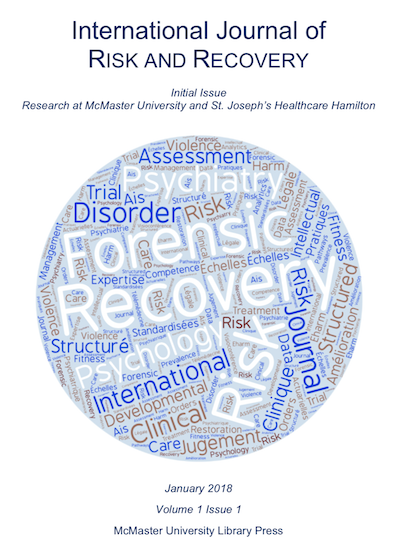Benefits and limitations of implementing videoconferencing for forensic psychiatry assessment in France
DOI:
https://doi.org/10.15173/ijrr.v1i1.3327Abstract
Telemedicine has been successfully used for many years in North America for the purpose of conducting forensic assessments. France, however, has not yet implemented this potentially useful tool. French forensic psychiatry could get inspired by this success in order to improve the practice of court ordered psychiatric assessments. In this article, we address the benefits and limitations of videoconferencing in the field of forensic psychiatry. Using these new means of telecommunications could help solve some of the issues encountered in France. (article in French)References
Senon JL, Manzanera C. Réflexion sur les fondements du débat et des critiques actuels sur l’expertise psychiatrique pénale. Ann Med Psychol 2006,164(10) :810-827
Jonas C. Expertise pénale : une audition publique, et après ? Information Psychiatrique 2008;84(3):189-191
Loi n° 2010-242 du 10 mars 2010 tendant à amoindrir le risque de récidive criminelle et portant diverses dispositions de procédure pénale. JORF du 11 mars 2010
Deschamps JL. L’expertise psychiatrique pénale – 1ère partie. Synapse 2004;204:14
Zamansky G. L’expertise psychiatrique en péril. AlloDocteur.Fr article du 02 février 2012
Wooton R, Hebert MA. What constitutes success in telehealth? J Telemed Telecare 2001;7(2):3-7
Lexcen FJ, Hawk GL, Herrick S, Blank MB. Use of video conferencing for psychiatric and forensic evaluation. Psychiatr Serv 2006;57(5):713-715
Norman S. The use of telemedicine in psychiatry. J Psychiatr Ment Health Nurs 2006;13(6):771–777
Manguno-Mire GM, Thompson JW, Shore JH, Croy CD, Artecona JF, Pickering JW. The use of telemedicine to evaluate competency to stand trial: a preliminary randomized controlled study. J Am Acad Psychiatry Law 2007;38(4):481-489
Antonacci DJ, Bloch RM, Atezaz Saeed S, Yildirim Y, Talley J. Empirical evidence on the use and effectiveness of telepsychiatry via videoconferencing: implications for forensic and correctional psychiatry. Behav Sci Law 2008;26(3):253-269
Bose UP, McLaren P, Riley A, Mohammedali A. The use of telepsychiatry in the brief counselling of non-psychotic patients from an inner-London general practice. J Telemed Telecare January 2001;7(1):8-10
Richardson LK, Frueh BC, Grubaugh AL, Egede L, Elhai JD. Current directions in videoconferencing tele-mental health research. Clin Psychol Sci Prac 2009;16(3):323-338
Circulaire du 2 septembre 2011 relative aux modalités d’organisation de la reprise des missions d’extractions judiciaires par le ministère de la justice et des libertés. JORF du BOMJL du 30 septembre 2011
Hyler SE, Gangure DP, Batchelder ST. Can telepsychiatry replace in-person psychiatric assessments? A review and meta-Analysis of comparison studies. CNS Spectrum 2005;10(5):403-415
Miller TW, Burton DC, Hill K, Luftman G, Veltkemp LJ, Swope M. Telepsychiatry: Critical dimensions for forensic services. J Am Acad Psychiatr Law 2005;33(4):539-546
O’Reilly R, Bishop J, Maddox K, Hutchinson L, Fisman M, Takhar J. Is telepsychiatry equivalent to face-to-face psychiatry? Results from a randomized controlled equivalence trial. Psychiatr Serv 2007;58(6):836–843
Published
How to Cite
Issue
Section
License
Copyright (c) 2018 Sebastien S Prat, Robert Courtois

This work is licensed under a Creative Commons Attribution 3.0 Unported License.
Copyright Notice
Authors who publish with this journal agree to the following terms:
- Authors retain copyright of their work and grant the International Journal of Risk and Recovery the right of first publication with the work simultaneously licensed under a Creative Commons Attribution License. This allows others to share the work with an acknowledgement of the work’s authorship and initial publication in this journal.
- Authors are able to enter into separate, additional contractual arrangements for the non-exclusive distribution of the journal’s published version of the work (e.g., post it to an institutional repository or publish it in a book) with an acknowledgement of its initial publication in this journal.
- Authors are permitted and encouraged to post their work online (e.g., in institutional repositories or on their websites) before and during the submission process as it can lead to productive exchanges, as well as earlier and greater citation of published work. (See The Effect of Open Access.)

